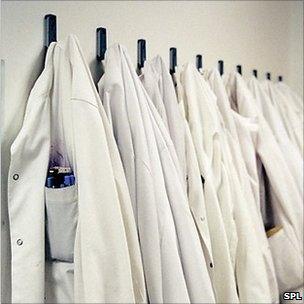Reaction to the science cuts
- Published

Many fear the cuts could still be a blow to the UK scientific research
The UK's science budget is to be frozen in cash terms, which equates to a cut of less than 10% over the next four years. The UK Chancellor George Osborne outlined the cuts in his Spending Review on Wednesday.
Here is the reaction to the announcement.
LORD KREBS, CHAIRMAN, HOUSE OF LORDS SCIENCE AND TECHNOLOGY SELECT COMMITTEE
I very much welcome this news.
The coalition has recognised that investing in the science base is a key element of economic recovery, and that it is important to maintain the UK's position at the very top of the international science league.
JOHN BEDDINGTON, UK CHIEF SCIENTIFIC ADVISER
I am delighted by the Government's decision to protect the science and research budget. This is a genuine signal that the Government recognises that science and research are vital in driving growth and securing a strong economic recovery.
The "frozen"/flat cash budget settlement for science and research needs to be put in context. This is a major success in the current position and will allow us to sustain the science and engineering base and build for the future.
The UK has a world leading tradition of excellence. This month for example we have seen UK scientists awarded Nobel prizes both in Physics and medicine, as well as Economics. The UK is also the most productive research nation in the G8 producing 14% of the most highly-cited papers, 9% of world research publications; whilst making up only 1% of world population...
...I urge the Scientific Community to respond positively to this signal of the value the government places in its role in the economy. We must now work to ensure priorities are recognised and public money is used effectively to enhance the UK economy and international standing as a world leader.
MARTIN REES, PRESIDENT OF THE ROYAL SOCIETY
The flat cash settlement for the core science budget is welcome news in the context of this very tough Spending Review.
The government has recognised the importance of sustaining the international standing of UK science in a context where other nations are forging ahead.
The support of science is crucial not only to the strength of our education system, but to economic recovery and the solution of global problems.
There remain areas of concern, especially with regard to capital spending, and the funding of universities.
But this outcome enhances our optimism that such issues can be addressed on the basis of a genuine realisation that it is in the UK's interests to remain among the world leaders in key areas of science and innovation.
IMRAN KHAN, DIRECTOR OF THE CAMPAIGN FOR SCIENCE AND ENGINEERING (CaSE)
By offering relative protection for research from cuts, maintaining a ring-fence for the science budget, and promising to increase medical research funding from the MRC and Department for Health in real terms, the government has signalled a desire to support science and engineering.
A 10% cut over four years is significant, especially at a time when our competitors like the US and Germany are having real-terms increases - but today saw an important 'statement of intent' from the coalition.
Important questions remain over the details of some of the funding plans - particularly over capital expenditure for Research Councils and universities, funding for the Technology Strategy Board, and the status of R&D tax credits.
But the scientific and engineering community will now look forward to engaging constructively with the government on how to put research at the heart of the UK's growth agenda.
MARSHALL STONEHAM, PRESIDENT OF THE INSTITUTE OF PHYSICS

Some observers say that PhD places could be reduced next year
It is good news for UK science that the government recognises the value of a strong scientific research base to the UK economy, which will be complemented by investment in an elite network of research and development intensive technology and innovation centres.
Make no mistake: even with a flat cash settlement the next few years will be challenging ones. The science community will need to work very hard to maintain the excellence of our research, retain the best young researchers and avoid any damage to our international reputation in a world where many other countries are increasing their investment in research.
But we have to be realistic. In our current financial situation, all sectors of society will have to face some sacrifices, and the science community accepts that it cannot be immune.
Over many years, UK researchers have proved that they can deliver outstanding results with relatively limited resources. I am confident that we will have the skill and determination to weather the next few years, and to contribute to the re-growth of our economy. In the longer term, I hope we will see a return to a steady increase in the level of funding for research, both by the public and the private sectors.
It will be some time before we know the detailed impact of this settlement for science. We will continue to watch the situation closely, and to make the case for protecting vital areas of the UK's research base.
COLIN BLAKEMORE, FORMER HEAD OF THE MEDICAL RESEARCH COUNCIL
It is wonderful to learn that government has listened to the scientific community.
Collectively we have made the case that funding science is not a cost but a way to invest in creating a stronger economy, which is the best way to guarantee the recovery that will benefit everyone.
It will now be important to maintain the dialogue with government as it reviews budgetary commitments for the future.
GAIL CARDEW, HEAD OF PROGRAMMES, THE ROYAL INSTITUTION
It is encouraging that the science budget will be maintained, given the critical role that research and innovation will play in the UK's economic recovery over the next decade.
While it is still a cut in real terms, this decision is a significant vote of confidence in the UK's scientific community and the contribution it makes.
MARK DOWNS, CEO, SOCIETY OF BIOLOGY
A 10% cut over four years is a significant blow to the UK's competitiveness.
The government has failed to recognise what all charities know - an economic downturn is the time to invest in fundraising to ensure future prosperity.
It is research and development, coupled with skilled people that will deliver growth. Our international competitors have recognised that: the coalition government has yet to fully accept that reality.
The Browne review, external was set up to ensure investment in our universities, not to simply substitute government funding.
Biology is at the heart of health, the environment, food security, biodiversity and climate change. There is no cheap option for teaching it well. Hands-on practical work in the laboratory or field must continue.
We urge the government to better recognise the differential costs between degrees.
Accreditation of research based degrees must play a central role in ensuring specific degrees meet the needs of employers and expectations of students, including high level practical training. The additional cost of this must be recognised.
PETER WEISSBERG, BRITISH HEART FOUNDATION
Immediate reaction? Relief that science has been spared the deepest of cuts.
Followed swiftly by the realisation that even at about 10% down, we'll be playing catch-up in an international field which could see UK science left behind.
We will have to wait before the full picture becomes clear, but it's likely charities will now come under greater pressure to fund more medical research.
Maintaining a strong Charity Research Support Fund for universities is therefore vital to ensure we can continue to fund life-saving science in partnership with both the Government and universities.
MALCOLM GRANT, PRESIDENT AND PROVOST, UCL
The quality - and value for money - of British science is outstanding.
The Chancellor's recognition of its economic value is truly welcome.
I hope that even with the reduced funding that this announcement implies, Britain can continue to train and recruit the best in the world and to lead in scientific discovery, innovation, improving the lot of mankind and the planet.
DAVID BROWN, CEO, INSTITUTION OF CHEMICAL ENGINEERS
We cautiously welcome the news that the science budget is set to be frozen in cash terms. Whilst it does still represent tough times ahead, things could have been much, much worse.
But the fact that we are now one of the only countries in the industrialised world that is not increasing our investment in science and research means that we need to think very carefully about how the money is spent and it must be increasingly directed towards applications that UK engineering can translate into commercial gain.
However the recommendations made in Lord Browne's report pose a grave risk to UK industry.
Some of our greatest economic assets are the graduates from our universities. If we can't produce enough talented scientists and engineers each year to meet industry demand, inward investment will suffer and our economic prosperity will be further weakened.
Government must look closely at which courses produce the graduates that have had - and will continue to have - a really positive impact on the UK economy and protect those subject areas accordingly.
- Published20 October 2010
- Published19 October 2010
- Published18 May 2010